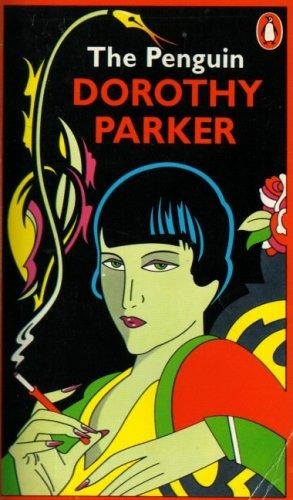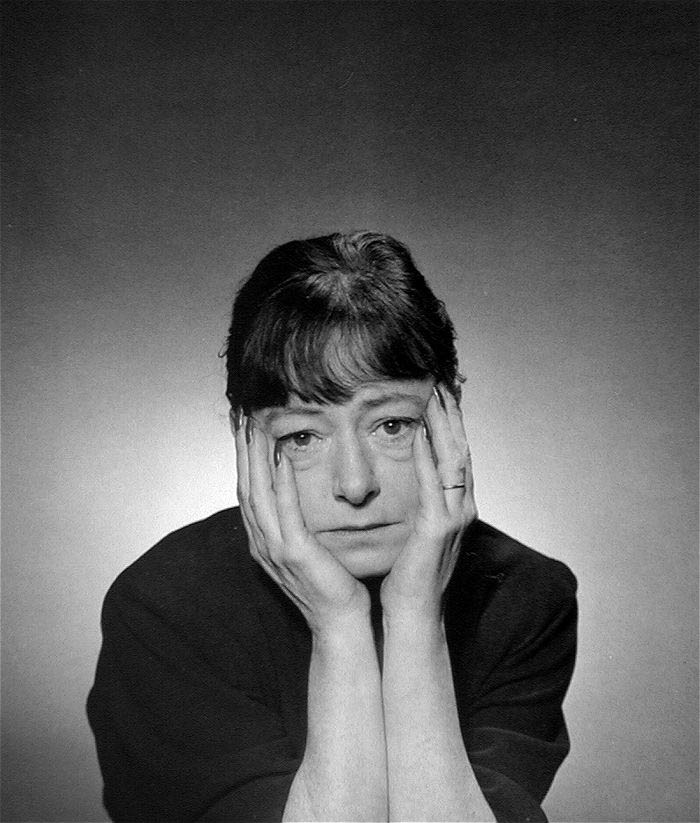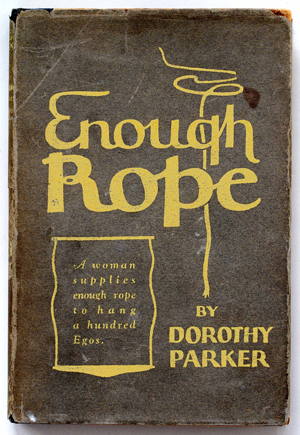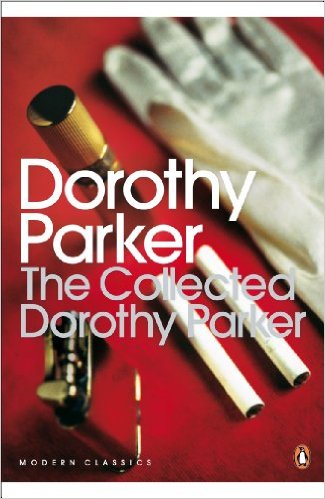Article by Kate Jones
I was a late starter: I didn’t discover Dorothy Parker (1893-1967) until several years ago, coming across a copy of The Collected Dorothy Parker (Penguin, 1989 [1977]) in my local branch of Oxfam and being unable to leave without it after reading several of the yellowing pages. I’d recently been studying the short stories of Katherine Mansfield for an English Literature degree, which, whilst well written, I’d found a little bit stilted.

If Katherine Mansfield had felt a little like a melancholy maiden aunt, Dorothy Parker unfolded to me as a feisty apparition of a favourite aunt your parents disapproved of. The one who has all the stories; knows the joys and the burdens of life and is willing to tell it how it is. Parker’s stories lay bare the frailties of women as she saw them and felt them, yet applauded their bravado.
The 1989 reprinted edition of her original Portable contains Parker’s short stories taken from her earlier collection, Here Lies (1936), and her many poems taken from Not so Deep as a Well (1939), as well as a selection of her reviews and literary journalism originally appearing in The New Yorker and Vanity Fair.
Writing the introduction for the original Portable Dorothy Parker, (Viking Press, 1944), Somerset Maugham commented that ‘Her style is easy without being slipshod and cultivated without affectation’. Her writing exposed the bitterest tragedies and frailties of the human psyche with such tenderness and pathos, yet displaying her humour, sarcasm, and an acerbic wit, causing the reader to be laughing and crying, often in the same sentence. Her poems have often been referred to as bitter and unwomanly, filled as they often are with a cynical eye. Reading them now, they are teeming with painful emotions and bittersweet reflections on human relationships; yet it is their humour, I feel, which burns through.
“Parker’s stories lay bare the frailties
of women as she saw them and felt them.”
Brendan Gill, in his introduction to The Collected Dorothy Parker, (1989 [1977]), says that Parker ‘enjoyed an early vogue’, (Intro, pxiii). In her poetry in particular, she made many references to suicide, and Gill points out that there were many readers who were astonished to learn of her death in 1967 at the age of 73 from natural causes, assuming, as her work fell into relative decline, that she had died earlier. She had enjoyed fame and money for a time, but spent the last of her days outliving her husbands and lovers and most of her friends, in a hotel room in Manhattan with her dog and a bottle for company. She had often, in her youth, alienated friends due to her cutting wit.
Parker started writing in the permissive era of the 1920’s, a time littered with social change, particularly in the area of women’s lives. Such areas as drinking, smoking, dancing and getting “caught” are prevalent in her work. The 1920s period reflected the relative freedom experienced by both genders, particular of the upper and middle classes, prior to the second world war.

Born Dorothy Rothschild in 1893, in West End, New Jersey, her Scottish mother died in Dorothy’s infancy and she grew up with an increasing dislike of her strict father and step-mother, attending a Catholic convent school in Manhattan. She later held an editorial position at Vogue, quickly moving to Vanity Fair to become a drama critic, and queen of the wisecracks. She took the name Parker from her first husband, Edwin Pond Parker II, and is said to have held a constant resentment at being Jewish. She was one of a handful of writers credited with helping to form the character of The New Yorker, founded in 1925, and her short stories became known afterwards as the recognizable genre of ‘The New Yorker short story’, which included such writers’ as Cheever and Salinger, amongst others, though they denied this ‘genre’ existed.
Parker’s work appeared in the magazine between 1926-1955, during which time she met the Hemingways and the Fitzgeralds whilst travelling, and her finished book of poems, Enough Rope, (1940, The Sundial Press) was published, becoming a best seller.
She married again, her second husband Alan Campbell, an actor-writer, was also known to be bisexual. She became pregnant but lost the child at three months, and worked on movies with her husband, becoming a political left-wing activist. They separated, only to remarry three years later, until his death in 1963.

Her stories often reflect the disparity in relationships between the genders. In ‘A Telephone Call’, Parker utilises, as she does in several of her stories, the use of soliloquy. There can be no reader who cannot identify with the agony of sitting and waiting for the person of their infatuations to call. (Note: for younger readers, add text/email/message – this reader is old enough to remember sitting beside an actual telephone attached to the wall). This short piece features the female protagonist relaying in monologue the suspense and agony of waiting for the call from her lover.
It opens: ‘Please, God, let him telephone me now’, and goes through the little tricks we play; ‘Maybe if I counted five hundred by fives, it might ring by that time. I’ll count slowly. I won’t cheat’. (p119).
She’s reflecting to the reader the ‘mistake’ she made earlier, calling him at the office. ‘He couldn’t have minded my calling him up. I know you shouldn’t keep telephoning them – I know they don’t like that’. (p119). She very much outlines in this story, as with many others, the moral codes men and women are complicit in, reflecting the societal norms of the time. She often represents emotionally frail women, desperate for affection and commitment, and the men who often don’t share that need. We see countless examples in these stories of young women, sitting around trying to be demure and waiting for men to come around and pick them up.
But this is by no means to say that Parker was a one-trick writer. In ‘Mr Durant’, one of my favourite stories from the collection, we have the opportunity to view the world through the eyes of a male perspective. Although, again the emphasis which bleeds through the text is that of the flippant treatment of the male protagonist toward his young mistress.
“Her observations of the cruelty with which
male/female relationships can play out is disturbing.”
Mr Durant is troubled by the fact that his young mistress, Rose, has fallen pregnant. Rose, a secretary in his office, he reflects, has a ‘sweet fragility about her, and an almost desperate timidity that Mr Durant had once found engaging, but that he now thought of with a prickling irritation’, (p37). A reflection which takes on an even more onerous tone when we discover his blatant disregard for her when insisting she get an abortion. He makes references such as ‘sleazy blouse’, and ‘childish legs’, (p37), where Parker gives us a disquieting taste of Durant’s conflict between the attraction of her seeming childishness, and therefore malleability, yet ‘sleazy’ clothing, enticing him to seduce her.
Mr Durant is further surprised at his willingness to sleep with a woman who is not a beauty, thinking of himself as ‘being just a big boy in the whole affair’, (p37). It is interesting here that Parker uses his title ‘Mr Durant’ throughout, whereas Rose and the other secretary in the office are spoken of by their first names, indicating the status of their positions throughout the story. Rose also confesses to Mr Durant that she is ‘in trouble’, a further indication of the state of sexual politics in Parker’s era, and Mr Durant arranges to get her ‘fixed up’, when really, he is irritated that he has been put to any of this bother at all. He feels he’s acting ‘gallantly’ paying the $25 for the procedure and getting another secretary to arrange it for Rose, almost as a distant father figure. He’s so happy when he’s seen Rose off in fact that he flirts with another young woman on the tram home, relating, ‘there came over him the cosy assurance that there would always be others’, (p42).
It is on his return home, however, that Parker gives us the fullest measure of this man, utilising her unflinching irony to deliver the punch to readers likely to already being judging Mr Durant with distaste.
His children and wife have taken in a stray dog, and in his good humour, he agrees they can keep it, though still the sexual innuendos are unrelenting, as he concedes the dog is; ‘not a beauty…the living souvenir of a mother who had never been able to say no’, (p43). It is only after he has agreed to keep the mutt, however, that he discovers from his wife that it is a female dog. He does not wish to appear to go back on his word – appearances are everything, it is made clear, to this character – but tells his wife ‘I wouldn’t give a she-dog house-room…it’s disgusting, that’s what it is’, re-iterating for her ‘All the males in the neighbourhood will be running after her’, (p46). Instead, he proposes to deal with the situation by putting the dog out in the night, causing the children to assume it ran away. In an echo to his ‘solution’ for ridding himself of the Rose ‘problem’, the story ends with his self-congratulatory notion that peace has been restored by ‘this simple solution of the little difficulty’, (p46).

Parker’s cynical, often cruel wit unfolds itself within this story to paint a picture of a deeply misogynistic male protagonist. Her observations of the cruelty with which male/female relationships can play out is disturbing in this story in particular.
Having read many short story collections and essays about short story writers, I find it astounding that this writer’s work is not celebrated or studied more often. She has been compared to her contemporaries, O’Hara and Hemingway, on occasions, and certainly knew how to hold her own during her heyday.
I think it’s high time for a re-reading of her work and the way it reflects male/female relationships, and societal limitations, both historically and now.
END
***
 Kate Jones is a freelance writer based in the North of England and has published features, reviews and essays in various places online including Thresholds, The State of the Arts, The Real Story and Skirt Collective. She has a passion for the short form, and has published many of her own flash fictions in places such as Spelk, Firefly, SickLit and Café Aphra, as well as winning the quarterly Flash500 competition and three times winner of AdHoc Fiction. Her writing has been nominated for a Pushcart Prize.
Kate Jones is a freelance writer based in the North of England and has published features, reviews and essays in various places online including Thresholds, The State of the Arts, The Real Story and Skirt Collective. She has a passion for the short form, and has published many of her own flash fictions in places such as Spelk, Firefly, SickLit and Café Aphra, as well as winning the quarterly Flash500 competition and three times winner of AdHoc Fiction. Her writing has been nominated for a Pushcart Prize.
